As the long row of helium-filled white balloons lifted off one by one into the night sky over Berlin, Tina Krone managed to gulp down a tear and lit a sparkler. “I haven’t seen that many people on the streets for 25 years,” she said, surveying the crowds at Bernauer Strasse.
On 9 November 1989, when she and thousands of other East Berliners streamed across the border into the west shortly before midnight, only those old enough to remember the building of the wall had cried.
Krone and her friends, on the other hand, had simply been lost for words: “‘Madness, sheer madness’. I know it’s not very original of me, but I must have said that a thousand times that night.”
An active member of the East German dissident movement, she had received a call from a friend in the west at about 10.30pm: “Have you seen the news? They’re saying the wall is open.”
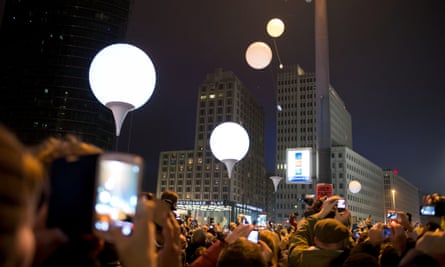
Because the closest border crossing to her at Bornholmer Strasse was already crowded, she and her partner jumped into their Trabant car to head to Kreuzberg.
When she had passed through the checkpoint at Heinrich Heine Strasse, a West Berliner thrust a bottle of beer into her hand, but she says she did not need to take a single sip to feel intoxicated.
In a bar, she and her partner met long-lost friends, who gave them a pile of western newspapers and a small colour TV as a welcoming gift. By daybreak, they were back at the checkpoint – there had been rumours that the border would close again at 8am.
Only when the guards waved them through for a second time did the reality sink in. “Then I knew there was no way back for the party bigwigs,” Krone says. “After that, it felt like our Trabi was flying us home.”
Whatever one’s views of the handling of the aftermath of the wall’s fall, memories of 9 November 1989 still have power. And while fall-of-the-wall anniversaries come and go, this year’s art installation, conceived by brothers Christopher and Marc Bauder, managed to create a rare thing: a memorial that felt both poignant and playful, thought-provoking but not maudlin.
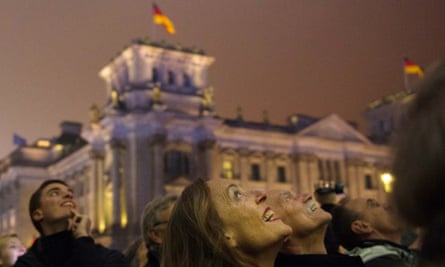
Since Friday morning, a so-called Lichtgrenze or “border of light”, made up of 8,000 balloons, has traced a section of the fallen wall across central Berlin for 15km (nine miles).
On Friday and Saturday night, thousands of Berliners old and young were out on the streets to walk along the old border.
Those who grew up in a divided Berlin are unlikely to ever forget the precise route of the old dividing line.
Krone says she still feels a bit queasy when she passes from east to west and recalls that it “hurt” the first time she passed under the Brandenburg Gate. The driver of the taxi in which she was travelling turned around and did it again, three times in total, “until it stopped hurting”.
But for tourists, it is surprisingly hard to tell these days where West Berlin used to start and East Berlin used to end. On Potsdamer Platz and near the central station, the area where the wall of light ran this weekend has been wholly renovated and is unrecognisable from the wasteland of 1989. In the hipper parts of Kreuzberg, the installation has reminded more recent arrivals that a country used to end right outside their doorstep.
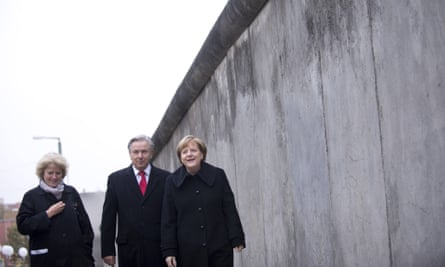
At 7.20pm, with a considerable delay, the first balloon floated into the night sky in front of the Brandenburg Gate. The Berlin State Orchestra played Beethoven’s stirring Ninth Symphony and outgoing Berlin mayor, Klaus Wowereit, gave a short speech. “Walls made of concrete and walls in our heads are surmountable when people come together and take their fate into their own hands,” he said.
At Bernauer Strasse, the row of balloons took a sharp left into Mauerpark, once a section of the death strip, now a giant park for residents. Some people had climbed on to the strip of wall in front of the Friedrich-Ludwig-Jahn sports stadium to get a better view, as if in tribute to the pictures that were transmitted around the world in 1989.
Back then it was here, in the Prenzlauer Berg district, that the power of crowds forced the first border point to open. On Sunday, the locals’ famed impatience was once again on display: a number let go of their balloons early.
This year’s commemoration of the fall of the Iron Curtain may also feel more poignant because there is a palpable sense that peace in Europe in 2014 is more fragile than it was at the 20th anniversary in 2009.
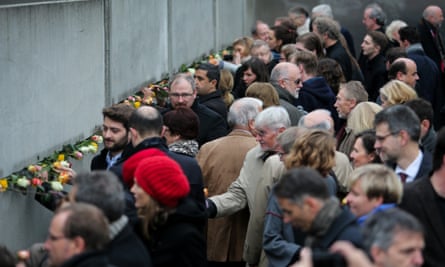
In her speech at the wall memorial on Bernauer Strasse on Saturday afternoon, Germany’s chancellor, Angela Merkel, had explicitly emphasised the geopolitical resonances of the event, instead of indulging in personal reminiscences.
“We have the strength to shape things, to turn things from bad to good, that is the message of the fall of the wall,” she said. “These days, that message is directed at Ukraine, Syria, Iraq and many, many other regions in the world.”
Merkel, who on 9 November 1989 had walked over into the west at the Bornholmer Strasse checkpoint on her way back from the sauna, with her wet towel still in her bag, said: “If one thing was wonderful about those days, it was the imagination that was being set free after having been suppressed for so many years.”
Jean-Claude Juncker, the president of the European commission, issued a statement on the anniversary, warning that “Europe must once again become a thing of the heart”. He said: “It was with passion and courage that the people tore down that which divided them, in search of peace, freedom, unity, democracy and prosperity. Two decades later, we must not forget that peace is not a given in Europe. More than ever, Europe must live up to its responsibility to safeguard freedom and peace.”
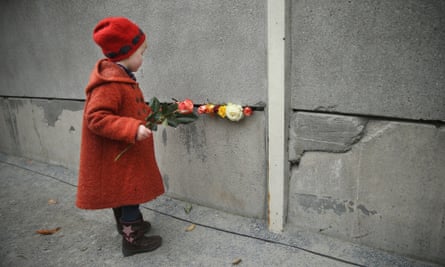
On Saturday, the former Russian president Mikhail Gorbachev warned of a “new cold war”, brought about by the west’s mishandling of the aftermath of the fall of the wall.
“Instead of building new mechanisms and institutions of European security and pursuing a major demilitarisation of European politics … the west, and particularly the United States, declared victory in the cold war,” said the man behind the Soviet Union’s glasnost and perestroika reforms, speaking at a symposium near the Brandenburg Gate.
“Euphoria and triumphalism went to the heads of western leaders. Taking advantage of Russia’s weakening and the lack of a counterweight, they claimed monopoly leadership and domination in the world.”
The enlargement of Nato, Kosovo, missile defence plans and wars in the Middle East had led to a “collapse of trust”, said Gorbachev, now 83. “To put it metaphorically, a blister has now turned into a bloody, festering wound.”
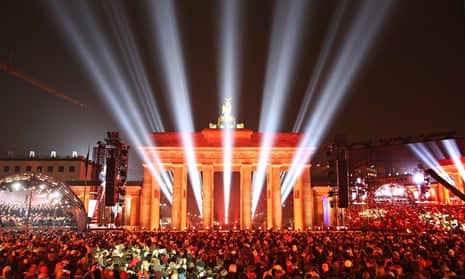










Comments (…)
Sign in or create your Guardian account to join the discussion